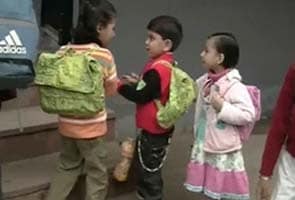
New Delhi:
The Delhi High Court is likely to pronounce its verdict on Tuesday on a PIL challenging government notifications giving powers to unaided private schools to formulate their own criteria for nursery class admission.
A bench comprising of Chief Justice D Murugesan and Justice V K Jain is expected to deliver the judgement on Tuesday morning on the PIL of NGO Social Jurist filed against two notifications issued by the Union Human Resources Development Ministry and the Delhi government.
It was alleged in the PIL that the notifications negated the Right of Children to Free and Compulsory Education Act (also known as RTE Act) as the private unaided schools were allowed to formulate their own criteria for nursery admission.
It also amounted to favouring a child over another on various grounds such as alumni and sibling by categorizing them, the petition said.
The verdict will assume significance in the backdrop of the Centre's contention that the RTE Act is not applicable to nursery admission and the city government can make its own policies.
Additional Solicitor General Rajeeve Mehra, appearing for HRD Ministry, had said the RTE Act provides for "free and compulsory elementary education" for children aged between 6 and 14 years and the state government is free to make "rules" for pre-school education for kids below 6 years.
However, Ashok Agarwal, counsel for the NGO, had opposed the contention, saying that it would virtually negate RTE Act as no seat would be left for six-plus kids.
On November 23, 2010, the HRD ministry had issued guidelines under the RTE Act that had allowed the schools to frame their own admission criteria, the NGO has submitted.
Later, the Department of Education of the Delhi government also issued similar guidelines, it said.
Earlier, the court had asked the Centre to clarify its stand as to whether the RTE Act is applicable to nursery admission or not.
The Centre had responded by saying the Act stipulates that the free and compulsory education would be provided to a child between the age group of 6 to 14 and that the states were free to formulate policies to govern pre-school (nursery) admission.
The court, during the hearing, had made it clear that its decision on the PIL would also affect the nursery admission for the 2013-14 academic session.
The PIL had alleged that the notifications gave "a totally free hand to all unaided recognised private schools to formulate their own nursery admission criteria based on categorisation of children."
However, the categorisation of kids in admissions have specifically been barred by the RTE Act, it submitted, adding that some schools still give preference in admission on grounds such as religion, alumni and sibling.
A federation of private schools, however, opposed the PIL, saying that the private institutions cannot be forced to "toe" the diktat as far as the admission process is concerned.
A bench comprising of Chief Justice D Murugesan and Justice V K Jain is expected to deliver the judgement on Tuesday morning on the PIL of NGO Social Jurist filed against two notifications issued by the Union Human Resources Development Ministry and the Delhi government.
It was alleged in the PIL that the notifications negated the Right of Children to Free and Compulsory Education Act (also known as RTE Act) as the private unaided schools were allowed to formulate their own criteria for nursery admission.
It also amounted to favouring a child over another on various grounds such as alumni and sibling by categorizing them, the petition said.
The verdict will assume significance in the backdrop of the Centre's contention that the RTE Act is not applicable to nursery admission and the city government can make its own policies.
Additional Solicitor General Rajeeve Mehra, appearing for HRD Ministry, had said the RTE Act provides for "free and compulsory elementary education" for children aged between 6 and 14 years and the state government is free to make "rules" for pre-school education for kids below 6 years.
However, Ashok Agarwal, counsel for the NGO, had opposed the contention, saying that it would virtually negate RTE Act as no seat would be left for six-plus kids.
On November 23, 2010, the HRD ministry had issued guidelines under the RTE Act that had allowed the schools to frame their own admission criteria, the NGO has submitted.
Later, the Department of Education of the Delhi government also issued similar guidelines, it said.
Earlier, the court had asked the Centre to clarify its stand as to whether the RTE Act is applicable to nursery admission or not.
The Centre had responded by saying the Act stipulates that the free and compulsory education would be provided to a child between the age group of 6 to 14 and that the states were free to formulate policies to govern pre-school (nursery) admission.
The court, during the hearing, had made it clear that its decision on the PIL would also affect the nursery admission for the 2013-14 academic session.
The PIL had alleged that the notifications gave "a totally free hand to all unaided recognised private schools to formulate their own nursery admission criteria based on categorisation of children."
However, the categorisation of kids in admissions have specifically been barred by the RTE Act, it submitted, adding that some schools still give preference in admission on grounds such as religion, alumni and sibling.
A federation of private schools, however, opposed the PIL, saying that the private institutions cannot be forced to "toe" the diktat as far as the admission process is concerned.
Track Latest News Live on NDTV.com and get news updates from India and around the world

